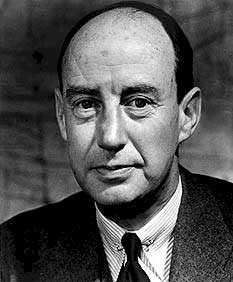About Adlai E. Stevenson
Adlai E. Stevenson was born in Los Angeles, California, grandson of vice-president Adlai E. Stevenson I. After studying history and literature at Princeton University (1918-22), he worked at the Bloomington, Ill., Daily Pantagraph while earning a Northwestern University law degree. He joined a conservative Chicago law firm, Cutting, Moore, and Sidley, in 1927, taking time out to work as special counsel for the Agricultural Adjustment Administration (1933-35) and serving as president of the Chicago Council of Foreign Relations.
He returned to Washington during World War II as attorney for Navy Secretary Frank Knox (1941-44). As special assistant to Secretary of State Edward Stettinus Jr., (1945-47), he mustered public support for the United Nations at the San Francisco conference, subsequently serving as senior adviser for the first General Assembly meeting.
As Democratic governor of Illinois (1949-53), he doubled funding for public education, ended political appointments to the state police department, and vetoed a state "antisubversive" squad. Drafted for president at the 1952 Democratic convention, he campaigned eloquently for principled politics, but lost to General Eisenhower. After traveling in Asia and the Middle East, he published A Call to Greatness (1954).
Campaigning for president again in 1956, he championed the suspension of nuclear testing and focused on race relations and conservation issues, but he lost to the popular Eisenhower. After founding the Democratic Advisory Council in 1957, he returned to his Chicago law firm.
Stevenson was later appointed as ambassador to the United Nations. In 1963, the Kennedy administration took a step he had long advocated by signing a treaty banning nuclear testing in the atmosphere. Although the UN had not been as effective as Stevenson had hoped, he regarded it as important. As ambassador, he battled to safeguard and strengthen the world organization, as in his successful resistance to Russian efforts to weaken the office of secretary general. In the UN, Stevenson employed his great prestige and skill in debate to defend American policies, such as opposition to the admission of the People’s Republic of China and resistance to Russian efforts to place missiles in Cuba, but he also brought the organization’s point of view into the councils of his own government. He urged Presidents Kennedy and Lyndon B. Johnson to heed world opinion and use UN machinery.

